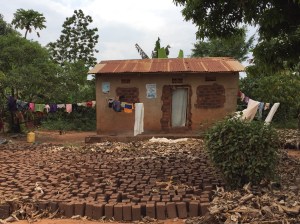Being in Naggalama: “You are welcome”
by Lorien E. Menhennett
It’s impossible to represent a region — much less an entire country — after only a few weeks there. But through working with the palliative care outreach team from Naggalama Hospital, I got a taste of life in and around this rural area. These are images and impressions from my time spent there.

To get to patients who live rurally, we took rutted roads for an hour or longer. To quote Jemella, who sat in the backseat with me: “This is what it must be like to be groceries in a bag.”
To put things in context: each weekday, we would leave from the hospital in vans and head out to patients’ homes to see people who needed palliative care (most often pain management). Some people lived in nearby towns; others on dirt roads an hour or more away.
I was immediately struck by how different life is in Naggalama compared to the places I’ve lived in the United States — Chicago, the Upper Peninsula of Michigan, Tucson, and now New York City. But United States or Uganda, people are people. So as much as I will remember the bumpy dirt roads and cramped brick houses, I will remember the gracious and kind souls who invited us into those houses with a warm smile, a light handshake, and this local greeting: “You are welcome.”
Note: Click on any photo to enlarge and start a mini slideshow.
Rural setting:
Town setting:
Getting around:

The boda-boda is a sort of motorcycle taxi. Most people don’t wear helmets, and accidents are a major cause of morbidity and mortality.
Flora and fauna: Being at the equator, all kinds of things grow here — bananas, coffee, avocados, corn, passion fruit, jack fruit, mangos, and more. Many people here are subsistence farmers who sell a little produce at the local market. Having animals is a sign that you possess a little (though not necessarily much) money.

















Wow, much be such an adventure to visit a place like that 🙂
LikeLike
It was! I feel so privileged to have met so many wonderful people there, and learned so much.
LikeLiked by 1 person
Thanks for the tour! The baby chicks and “piggies” were my favorites! Well–I did enjoy seeing you “drinking coffee” as well! 🙂
LikeLike
The “piggies” photo is one of my favorites too. We were throwing them some trail mix, and they were super excited about that.
As for the coffee — if only it had been really drinkable! Most everyone there drinks Nescafe. And you know how I am about instant coffee. Not exactly my favorite thing in the world. I stuck to tea while I was there instead.
LikeLike